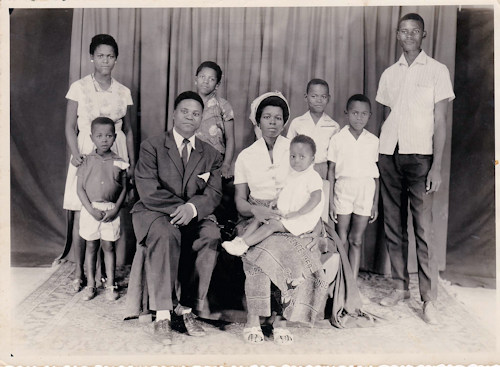
A new exhibition at the Weltmuseum Wien seeks to combat society’s convenient collective willingness to forget and ignore a past that deserves remembrance and reappraisal. Stories of Traumatic Pasts casts a critical and artistic eye over three significant examples from European history.
- Artists use their work to help ensure a continuing examination of such issues as colonialism, anti-semitism and nationalism
- Focus on selected time periods in Belgium, Austria and ex-Yugoslavia
- Organised by the Academy of Fine Arts Vienna as part of the outcome of a research project
- Runs Oct 8, 2020- April 3, 2021
- See also:
- Current Weltmuseum visitor and ticket tips
- Current exhibitions in Vienna
“Counter-archives for future memories”

(Monique Mbeka Phoba, A Family Album Photo 3 © Monique Mbeka Phoba)
I like the Weltmuseum. I like how it doesn’t shy from highlighting topics that might feel uncomfortable for a more defensive ethnographic museum, such as cultural appropriation or the repatriation of museum exhibits with a colonial past.
And any place that encourages us to look beyond the borders of our own cultures deserves credit in today’s world, where real borders seem to be hardening and empathy is in ever shorter supply.
Anyway, the Stories of Traumatic Pasts exhibition pulls no punches in terms of tackling sensitive issues.
Organised by the Academy of Fine Arts Vienna and drawing on the results of an interdisciplinary research project, the exhibition examines the apparent willingness of societies to forget and ignore their own past failings. It focuses on three traumatic and poignant examples:
- Belgian colonialism (and its representation since the Congo gained its independence)
- Anti-semitism in 20th-century Austria (national socialism and the holocaust)
- Balkan nationalism (war and genocide in ex-Yugoslavia)
Works by over a dozen national and international artists seek to counteract the seductive pull of that all-too-convenient collective amnesia. They fight the tendency to cast a mantle of silence over those events we’d prefer not to confront.
Needless to say, this topic area achieves added importance through the current political situation. The Black Lives Matter movement, for example, invites people not only to consider the systemic racism still existing today but also to reflect on the past roles their own country played in slavery or oppression of particular groups.
The exhibits – photos, videos, augmented reality experiences, complex installations and similar – all tug at the conscience, their very nature encouraging us to experience for ourselves the desire to look away, tempered by the understanding that we really should not do so.
Fo reasons I cannot explain, I was particularly taken by the works concerning the impacts of Belgium’s colonial presence in Africa. Monique Mbeka Phoba’s family photos, for example.
Or Coloniality / Conviviality by Joëlle Sambi Nzeba and Nicolas Pommier. Their table display questions whether victims and perpetrators can ever “sit at the same table to eat” in any real sense without, for example, acknowledgement or recognition of what passed.
Dates and tickets
The exhibition runs from October 8th, 2020 to April 3rd, 2021. No special fee applies – just get a standard ticket for the Weltmuseum or use a city sightseeing ticket like the Vienna Pass (review).
A free English booklet at the entrances to the galleries contains comprehensive details of the exhibition as a whole and each individual installation.
How to get to the exhibition
Check the travel advice on the main Weltmuseum page. The museum occupies the western part of the Neue Burg wing of the Hofburg complex in Vienna’s city centre.
The exhibition takes place in the open-sided galleries that immediately surround the open atrium area one floor up from the entrance. But be sure to go through the doors at the back of each gallery to see all the installations.
For those seeking more information on anti-semitism and the darker years of Austria’s 20th-century history, consider going to the other end of the Neue Burg building and the House of Austrian History. Or walk through the Hofburg to the Jewish Museum on Dorotheergasse.
Address: Heldenplatz, 1010 Vienna